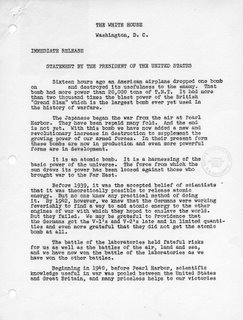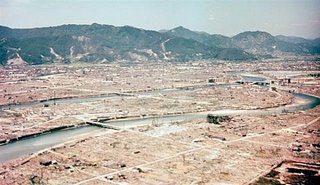Truman's Choice
 61 years ago this week the United States dropped the first atomic bomb on Hiroshima, Japan and three days later, a second on Nagasaki. The immediate death toll of those two bombings is estimated to be 110,000 people, with another 230,000 dying over the course of the next few years due to radiation sickness and injuries acquired in 1945. The two targeted cities were not chosen due to their military value to Japan, nor were the majority of those killed military personnel; the two targets were civilian centers of population and those killed were primarily women, children, the elderly, and other non-combatants.
61 years ago this week the United States dropped the first atomic bomb on Hiroshima, Japan and three days later, a second on Nagasaki. The immediate death toll of those two bombings is estimated to be 110,000 people, with another 230,000 dying over the course of the next few years due to radiation sickness and injuries acquired in 1945. The two targeted cities were not chosen due to their military value to Japan, nor were the majority of those killed military personnel; the two targets were civilian centers of population and those killed were primarily women, children, the elderly, and other non-combatants.The decision to reveal to the world the existence and the unprecedented destructive power of atomic weapons was made by President Truman, who was faced with an enemy that was unwilling to negotiate a peaceful end to the war in the Pacific. Planning for an allied invasion of the Japanese home-islands was underway, and those plans were set to commence in November, 1945. The Joint Chiefs of Staff had estimated that if the invasion took 90 days, allied casualties could be in the range of 500,000 wounded with over 100,000 allied deaths.
Truman's dilemma and Truman's choice boiled down to a simple question of priorities: during wartime, is the health and safety of enemy civilians more important to a nation than the health and safety of their own troops?
 Truman decided that they were not, and despite the horrific after-effects of the radiation sickness and the appalling devastation of Hiroshima and Nagasaki, history has appeared to support his decision. Radio intercepts from the period, fully released in 1995, show a number of entries relating to the encouragement of the Japanese military to fight to the last man should the home-islands be invaded. Stories of Japanese soldiers fighting for years after the Japanese surrender support Truman's belief that an invasion would be met with fanatical resistance, costing the allies hundreds of thousands of lives.
Truman decided that they were not, and despite the horrific after-effects of the radiation sickness and the appalling devastation of Hiroshima and Nagasaki, history has appeared to support his decision. Radio intercepts from the period, fully released in 1995, show a number of entries relating to the encouragement of the Japanese military to fight to the last man should the home-islands be invaded. Stories of Japanese soldiers fighting for years after the Japanese surrender support Truman's belief that an invasion would be met with fanatical resistance, costing the allies hundreds of thousands of lives.Less than a century later, Truman's choice is once again being made by nations at war. The primary concern during the current Middle Eastern conflict is the death toll of the Lebanese civilians under the onslaught of the Israeli response to Hezbollah. Like the Japanese, Hezbollah is fanatical in their attacks, and perfectly comfortable utilizing every last man, woman, and child in their battles.
The issue in the Middle East today is the same issue that has been faced by commanders in wartime throughout history; it's one of value, and determining if what you require is worth what it will cost. Civilian deaths are not in and of themselves unpalatable; on the contrary, combatants have regularly decided that certain ends will justify certain means in time of war.
Hezbollah has never made any attempt to hide their usage of their own civilians in their activities, and they pioneered terrorist attacks on civilian targets during the years of the first Israeli occupation of Lebanon. It is a brilliant strategy for fighting Israel; Hezbollah's ability to absorb Israeli reprisals -- which provide them the ancillary benefit of the tremendous public relations victories -- will far outstrip Israel's willingness to inflict civilian damage as well as Israel's capacity to withstand international censure. As the strongest kid on the block, Israel is expected to utilize a restraint that Hezbollah has taken advantage of for many years, and only with this most recent action has Israel upset the status quo with the use of disproportionate force.
 In the current conflict, much has been made of the Lebanese casualties inflicted by Israel. Claims that Israel is intentionally targeting civilian areas diminish Israel's reputation, and undermine support for the war both at home and abroad. Yet targeting civilian areas is a tactical necessity for Israel due to Hezbollah's practice of embedding themselves in high density civilian areas as well as U.N. bases.
In the current conflict, much has been made of the Lebanese casualties inflicted by Israel. Claims that Israel is intentionally targeting civilian areas diminish Israel's reputation, and undermine support for the war both at home and abroad. Yet targeting civilian areas is a tactical necessity for Israel due to Hezbollah's practice of embedding themselves in high density civilian areas as well as U.N. bases.The term "tactical necessity" for Israel's actions wasn't mine; it was employed by a Canadian U.N. Observer in an email to a Canadian politician, as the observer described how their outpost was taking Israeli fire. The email suggested that Hezbollah was operating from within the confines of the U.N. observer's camp boundaries, forcing Israel to target the U.N. base in order to neutralize the Hezbollah combatants. The Canadian observer was later killed with three others when his U.N. outpost was shelled by Israeli artillery.
Hezbollah employs a strategy that practically guarantees that Israel will suffer the public relations debacle of killing non-combatants. Kofi Anan's claim that Israel had deliberately targeted the U.N. position, without mentioning how the neutrality of the position was compromised by Hezbollah forces attempting to use the U.N. base as a shield, demonstrates how effective the strategy is. Hezbollah has a very pragmatic recognition of the value of civilian deaths to bolster their cause.
 Specifically, when the inevitable civilian deaths occur, Hezbollah is extraordinarily adept at using those deaths to their greatest advantage. Following the unfortunate Israeli attack at Qana on July 30th, there were many horrific images of bodies being dragged from the rubble. Yet despite the many casualties, surprisingly the same child's body was photographed being loaded into several different ambulances, over the course of several hours, recreated for several different photographers. The fellow you see in this NY Post cover photo is known as "Green Helmet" due to his recurring role in staged photo events in Qana following the attack. Hezbollah has never been above exploiting the very real tragedy of civilian casualties for maximum public relations exposure.
Specifically, when the inevitable civilian deaths occur, Hezbollah is extraordinarily adept at using those deaths to their greatest advantage. Following the unfortunate Israeli attack at Qana on July 30th, there were many horrific images of bodies being dragged from the rubble. Yet despite the many casualties, surprisingly the same child's body was photographed being loaded into several different ambulances, over the course of several hours, recreated for several different photographers. The fellow you see in this NY Post cover photo is known as "Green Helmet" due to his recurring role in staged photo events in Qana following the attack. Hezbollah has never been above exploiting the very real tragedy of civilian casualties for maximum public relations exposure.Mainstream media encourages an ongoing perception of Israel targeting civilians throughout this war, highlighting how the Israeli Air Force immediately destroyed the Lebanese airport, television and radio stations, and power centers. That same media fails to mention how those targets are commonly the first to be hit when a nation goes to war with another nation. Despite popular international opinion being against them, Israeli citizens certainly seem to understand the justification for their nation's actions as the prosecution of the war receives incredibly high levels of support.
When the deaths of civilians in warfare is considered, the question of relative value is skewed against Israel. In the current Middle Eastern war, world opinion appears to be more horrified by Lebanese civilians dying en masse in Israel's battle with Hezbollah than Israeli civilians dying a few at a time at the hands of Hezbollah suicide bombers and rockets.
While the rest of the world generally does not consider the deaths of Israeli civilians sufficient provocation to result in the deaths of non-Israeli civilians, the government of Israel has a clear preference. Countries must often respond to attacks against their national sovereignty with force, and while it is admirable to consider the needs of enemy non-combatants and reduce civilian casualties, as a strategy for winning the war those needs cannot be accommodated at the expense of a nation's national security.
Nearly 1,000 Iraqi civilians were killed in the first Gulf War, and an estimated 30,000 German non-combatants were killed in the firebombing of Dresden in World War II. Over 110,000 died due to the atomic bombing of Hiroshima and Nagasaki. Civilian deaths, though lamentable, are often an unfortunate consequence of armed conflict. It is hypocritical for the international community to hold Israel to a standard that few nations have themselves upheld.
Like Truman's choice in 1945, Israel too has a choice to make regarding what is in its long-term best interests. Despite the loss of its moral credibility and the regrettable civilian deaths in Lebanon, Israel must be primarily concerned with the pursuit of a tactical victory over Hezbollah; a fanatical enemy that has proven they will not accept a peaceful cessation of hostilities.


1 Comments:
Bravo!
Post a Comment
<< Home